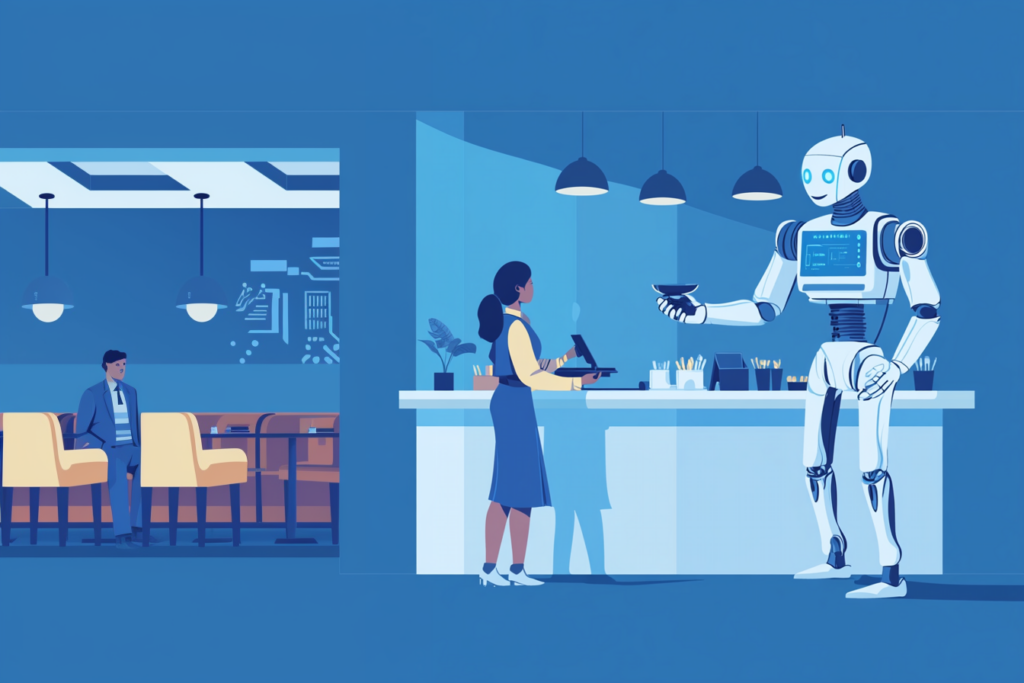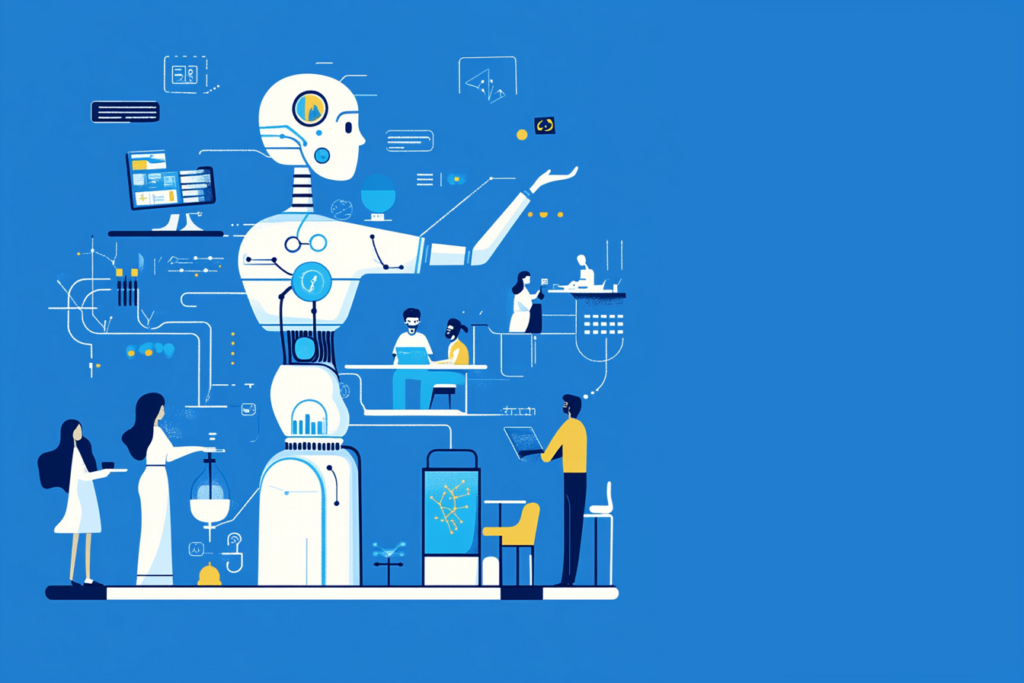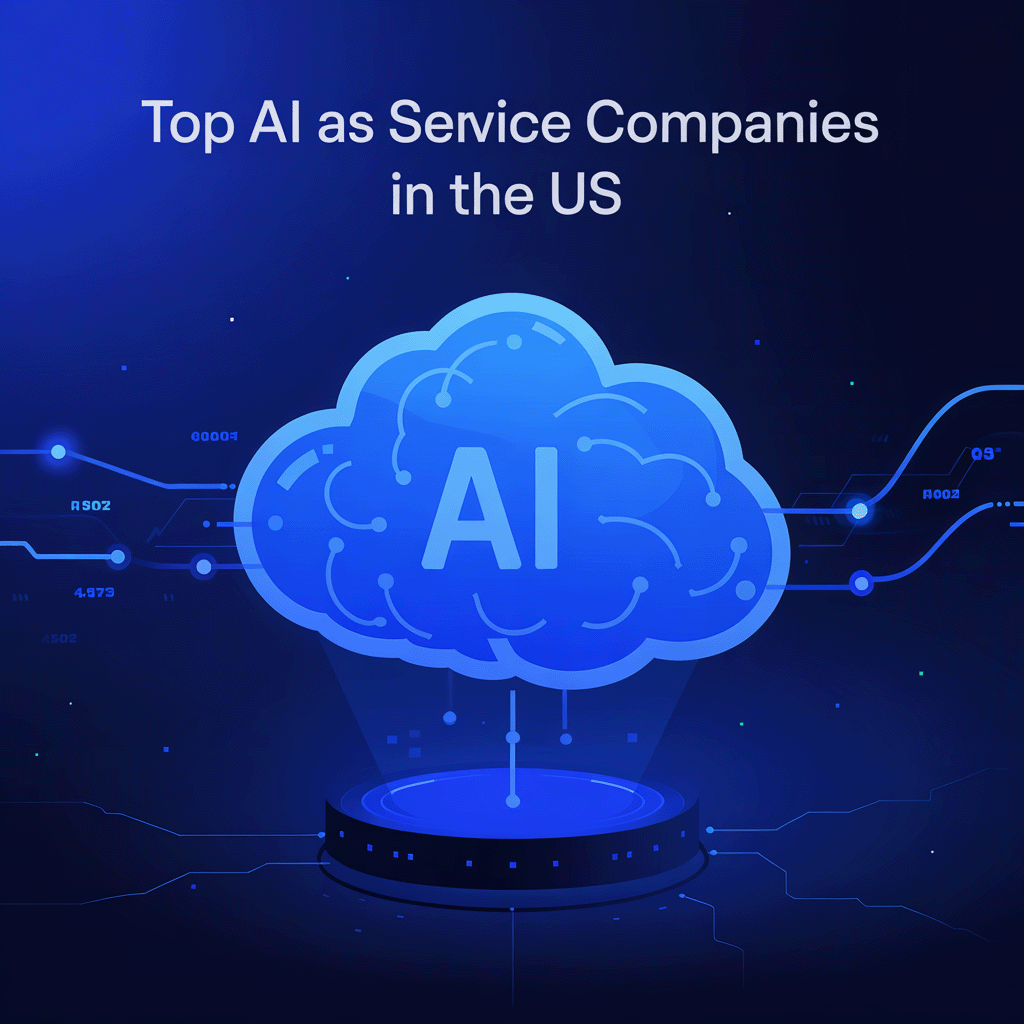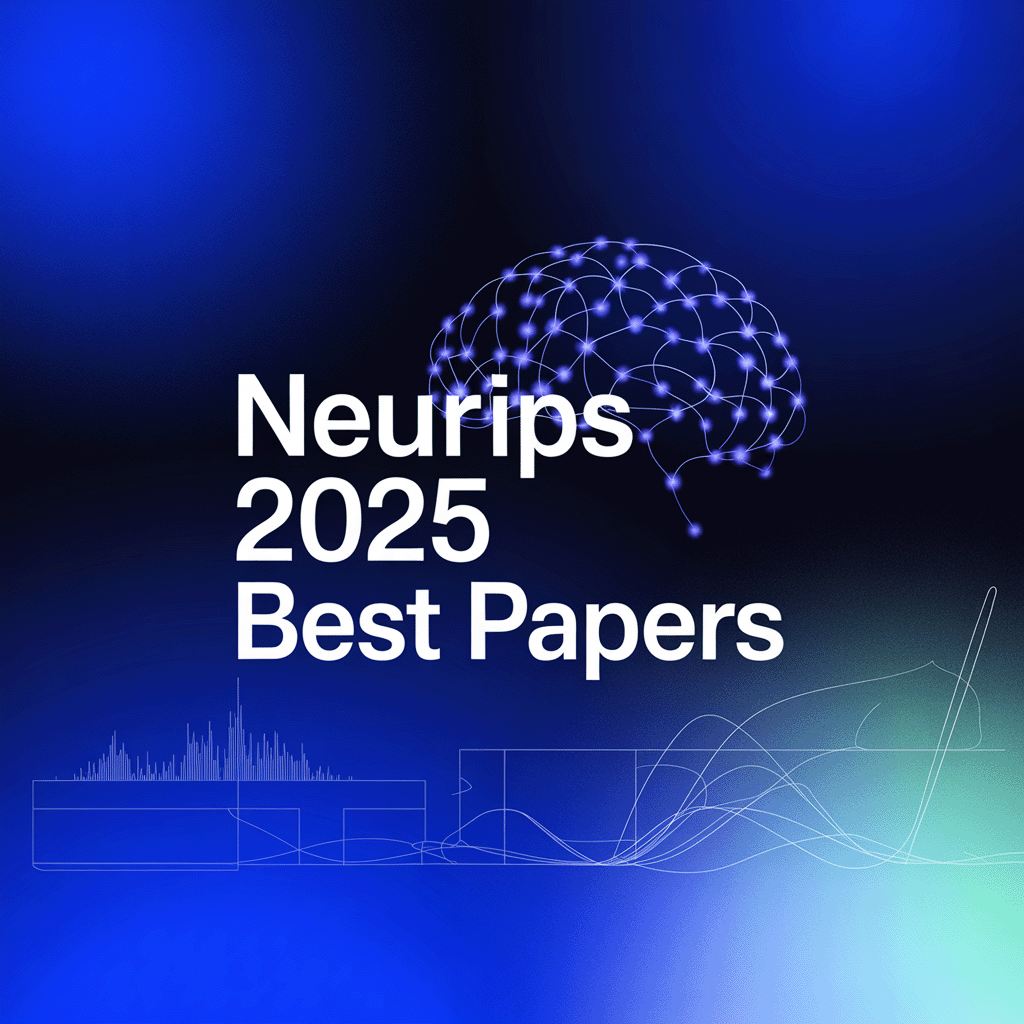Operational efficiency, tailored experiences, and customized guest interactions — all of these are at the core of the hospitality industry. Needless to say, this is what has made hotels increasingly adopt technologies to meet their ever-changing customer demands.
More than anything else, numbers prove this to a great extent. In 2022, the market of artificial intelligence in the hospitality industry was valued at USD 90 million. By 2033, it is expected to reach over USD 8.1 million, reflecting a CAGR of 60% during the forecast period.
Such a high growth rate may sound shocking. But once you get familiar with the benefits and use cases associated with AI in this industry, you’ll understand.
Before we delve into the details, here’s one more fact about AI in the hospitality industry: more than 70% of hotel guests believe AI chatbots are useful for answering their basic queries like Wi-Fi passwords and check-in and check-out timings.
Understanding AI in the Hospitality Industry
What is AI for Hospitality?
The hospitality industry, which was traditionally driven by personalized service and human interaction, is increasingly turning to artificial intelligence so as to enhance guest experiences as well as boost efficiency.
AI consists of a range of technologies, including robotics, natural language processing, and machine learning, all of which overall contribute to streamlining the operations in the hospitality sector. Machine learning enables systems to learn from data patterns, further allowing hotels to anticipate guest preferences and accordingly refine their pricing strategies.
Natural language processing supports communication between AI and guests, which allows chatbots and virtual assistants to comprehend human language and respond to inquiries immediately. Finally, robotics helps in repetitive task automation in the hospitality industry, improving efficiency. In simple words, AI can perform tasks that generally need human intervention, such as problem-solving, language understanding, and decision-making.

The Evolution of AI in Hospitality
AI-driven systems can process large amounts of data, providing real-time insights into operational inefficiencies, booking patterns, and customer preferences. This allows AI in the restaurant industry, travel companies, airlines, and hotels to provide more customized services, forecast guest demands, and minimize costs.
AI scheduling assistants can optimize booking and reservation management, further enhancing operational efficiency. As a matter of fact, AI in travel and hospitality has resulted in a digital transformation, making businesses in the sector use data-driven technologies to improve their overall outcomes.
Initially, only basic automation tools such as customer databases and reservation systems were being used. But now, companies have started using smart room technologies to enhance customer experiences, predictive analytics to forecast demand, as well as chatbots for customer service. Additionally, AI is being leveraged in logistics to optimize supply chain management and improve inventory tracking, further enhancing efficiency across the business.
AI Technologies Impacting Hospitality
-
Machine Learning: Machine learning for hospitality analyzes large datasets to recognize preferences and trends, enabling hotels to customize services and refine pricing dynamically. For example, ML algorithms can forecast peak booking times according to historical data.
-
Natural Language Processing (NLP): NLP allows virtual assistants and chatbots in the hospitality industry to engage with guests in a conversational way, responding to their queries and providing tailored recommendations round-the-clock. This helps in improving customer satisfaction as well as interaction.
-
Chatbots and Virtual Assistants: These tools improve communication by managing service requests, booking processes, and routine inquiries, substantially minimizing wait times and improving operational efficiency.
-
Predictive Analytics: Through the analysis of previous market trends and behaviors, predictive analytics aids hotels in anticipating demand with high accuracy, improving inventory management, and establishing dynamic pricing strategies that increase revenue.
-
Robotics and Automation in Hospitality Industry: The increasing use of robotics is due to its ability to automate tasks. It is being used for jobs like cleaning and room service delivery, enabling human staff to work on complex customer interactions.
-
Smart Rooms and IoT: The best method to increase customer satisfaction is through the integration of the Internet of Things or IoT. When integrated into hotel rooms, it enables tailored guest experiences via automated control for entertainment systems, temperature, and lighting — all according to the needs and preferences of guests.

Key Benefits of AI in Hospitality
1. Enhancing Customer Experience
The one thing most important about the hospitality industry is the delivery of exceptional customer experience. In fact, it is the most crucial factor, especially to stay competitive. Fortunately, AI-driven solutions allow businesses to offer personalized services that make every guest feel special.
-
Personalized Services: Based on previous behavior, preferences, and interactions, AI systems can offer customized offers and recommendations. For example, hotels can provide customized room recommendations according to the guest’s past stays. Thus, businesses can curate tailored, unique experiences for each customer, enhancing loyalty and satisfaction.
-
AI-Driven Concierge Services: AI and NLP-powered virtual assistants and chatbots in hospitality industry can offer assistance to guests 24/7. From making restaurant reservations to answering FAQs, they can handle a wide variety of tasks.
-
Voice Recognition and NLP: Voice assistants like Google Assistant and Amazon Alexa can be integrated into hotel rooms, enabling guests to control the television, lights, and even the temperature of the room.
-
AI-Enabled Smart Rooms: Smart rooms adjust automatically according to the preferences of guests. All room settings can be pre-set according to their previous preferences and even adjusted in real-time.
2. Operational Efficiency
AI in hotels isn’t just about enhancing the guest experience — it is a game-changer for back-end operations. By optimizing workflows and automating repetitive tasks, AI improves efficiency, minimizes human error, and aids hospitality businesses to run effortlessly.
-
AI in Streamlining Back-End Operations: AI tools can help with inventory management, procurement, and staff scheduling. They can anticipate future demand according to trends, monitor inventory levels in real time, and automatically reorder stock when required. Similarly, it can also optimize staff schedules, making sure that the right number of employees are working during peak times. This enhances service delivery and reduces labor costs.
-
Automating Repetitive Tasks: Several tasks in the sector, such as billing, room service requests, and check-in/check-out are prone to human error due to their repetitive nature. AI systems, such as an automated kiosk and AI hotel chatbot, can manage these tasks, reducing human error, operational costs, and productivity.
-
Real-Time Data Collection: AI-powered systems can collect and analyze data from a wide variety of sources, including customer feedback, booking systems, operational performance, and inventory levels. This assists higher authorities with quick, data-driven decision-making. Decisions related to supply chain optimization, room rate alteration, and staffing level adjustment can be based on actionable, updated insights.
3. Cost Savings and Revenue Growth
The ability of AI to optimize resource usage, enhance revenue management, and minimize waste is increasingly resulting in cost savings and more efficient operations in the hospitality sector.
-
Dynamic Pricing and Revenue Optimization: AI algorithms analyze large amounts of data, such as market conditions, competitor pricing, and demand patterns, which allows businesses to adjust room rates in real time. This further helps hotels maximize revenue by charging their guests the right price at the right time. According to a study by Cornell University, AI dynamic pricing can assist hotels in augmenting revenue by a maximum of 15%.
-
Reducing Energy Consumption: Through AI-powered smart systems like lighting systems and thermostats, AI in hotels can help track and control energy usage. Hotels can adjust them on the basis of environmental conditions, room occupancy, as well as guest behavior. Overall, the systems aid in the reduction of energy waste, further minimizing operational costs and contributing to sustainability.
-
Improved Resource Allocation: AI also refines the allocation of resources like cleaning products, linens, and food. Through the analysis of customer usage patterns and their data, AI-powered systems can anticipate demand with higher accuracy and ensure efficient use of resources. This lowers costs and reduces waste significantly.
4. Data-Driven Insights for Decision Making
The ability of artificial intelligence to analyze massive datasets and convert them into actionable insights is revolutionizing decision-making processes across the travel and hospitality industry. When they leverage data analytics, ventures can enhance their marketing strategies, optimize business operations, and predict demand.
-
Customer Behavior and Marketing Strategies: Artificial intelligence in hotels analyzes customer data, such as interactions, feedback, and booking patterns, in order to offer a deeper comprehension of guest preferences. This allows businesses to align their marketing efforts with their customer demands, target certain customer segments, and form tailored promotions that boost conversion rates. AI Marketing Analytics can provide real-time insights into the effectiveness of marketing campaigns, enabling businesses to fine-tune their strategies and improve customer engagement. For instance, a hotel can send customized offers according to a guest’s previous stays, resulting in better loyalty and engagement.
-
Predictive Analytics for Demand Forecasting: Predictive analytics tools can help in predicting trends and demand. By evaluating previous data, AI can anticipate peak booking hours, seasonal patterns, and occupancy rates. This helps hotels to plan ahead, optimize room pricing, adjust staffing levels, and make sure that they are prepared for demand fluctuations in advance. This results in higher profitability and better resource management.
5. Enhanced Security and Safety
The security and safety of guests is paramount in the travel and hospitality sector. In fact, AI for hospitality is increasingly contributing to improving these areas through innovation and advanced technology.
-
AI in Surveillance and Security Systems: AI-driven surveillance systems use facial recognition and anomaly detection to enhance security measures. For example, AI can track event spaces and entrances of hotels, altering the staff regarding any unauthorized access or unusual activities. This aids in the prevention of security breaches as well as improves guest safety, eventually letting the staff and the guests be at ease.
-
Contactless Services for Increased Safety: In a post-pandemic world, contactless services have become extremely crucial. Luckily, AI allows contactless check-ins, room service ordering via kiosks and mobile apps, as well as digital keys. This not only promotes hygiene but also minimizes physical interactions.

Use Cases of AI in the Hospitality Industry
Artificial intelligence contributes majorly to transforming the hospitality industry. From streamlining operations to improving customer service as well as enhancing guest experiences, AI technologies are transforming the future of businesses in the sector.
Below, we will explore how the technology is being used in a variety of sectors of the hospitality industry, sharing use cases along with examples and benefits.
1. AI in Customer Service
Chatbots & Virtual Assistants: AI-powered virtual assistants and chatbots in the hospitality industry can manage various kinds of customer service tasks, such as making customized recommendations, offering booking assistance, and answering guest inquiries. These systems can function around the clock, providing efficient and consistent service without the requirement of human intervention. They also support several languages, easing communication, and providing a more inclusive experience for guests from across the globe.
Case Example: Hilton’s Connie, an AI Concierge Robot: Among the most popular instances of conversational AI hospitality is Hilton’s AI concierge robot Connie. It leverages IBM’s Watson cognitive computing system to engage with customers and offer information regarding hotel services, local attractions, and much more. The robot utilizes NLP to comprehend and respond to customer inquiries, providing a smooth, conversational experience.
Benefits: The establishment of AI-driven chatbots and virtual assistants such as Connie offers major benefits. The round-the-clock availability makes sure that customers have access to assistance at all times. Furthermore, AI systems can comprehend and process numerous languages, providing multilingual support to global travelers, thus enhancing guest accessibility and satisfaction.
2. AI in Smart Hotel Rooms
Integrating AI with the Internet of Things is leading to a novel generation of smart hotel rooms that adapt to guest demands and preferences, making their stays more convenient and comfortable. By combining artificial intelligence with IoT devices, hotels can offer customized experiences that enhance guest satisfaction while also improving operational efficiency.
Integration of AI with IoT Devices: Artificial intelligence in hotels, particularly in smart hotel rooms, operates by connecting devices, such as entertainment controls, lighting systems, and thermostats, to a central AI system. This enables the room environment to be automatically adjusted according to guest behavior or preferences.
For instance, the temperature can be set according to the customer’s preference upon arrival or the lighting can change to form the perfect ambiance for work or relaxation.
Case Example: Marriott’s IoT Guestroom Technology: It integrates with a variety of smart devices to form a personalized room experience. The system utilizes data about guest behavior to adjust the environment of the room.
For example, if a guest happens to set the temperature to a certain level, the system will always remember the preference. Moreover, guests can use voice commands to adjust entertainment systems, temperature, and lighting, making their experience at the hotel more intuitive.
Benefits: AI-powered smart rooms offer several benefits. For guests, the systems improve convenience and comfort, providing a tailored experience without needing any manual adjustments. Also, AI-driven energy management enhances energy efficiency by minimizing waste, since the room environment can be adjusted according to guest preferences and occupancy. For hotels, it can result in lowered operational costs while also boosting guest satisfaction, as guests love greater control over their surroundings.
3. AI in Hotel Management Systems
AI is revolutionizing hotel management systems, which are responsible for handling a hotel’s operations, such as guests, requests, housekeeping, and room bookings. By automating repetitive tasks, artificial intelligence in hotels enables staff to focus on more pressing, guest-facing responsibilities, overall enhancing efficiency and guest experience.
AI in Property Management Systems (PMS): AI-powered PMS systems can automate various tasks such as guest request management, housekeeping, scheduling, and check-in/check-out. AI can also optimize room assignments by evaluating available resources, occupancy rates, and guest preferences. This makes sure that rooms are assigned in the best possible manner, augmenting guest satisfaction, and minimizing the workload for staff.
Case Example: Accor’s AI-driven Automated Room Allocation: A global hospitality company, Accor uses AI-driven room allocation systems to automate the process of check-in and room assignments. This is based on guest preferences, previous stays, and loyalty status.
The system makes sure that the guests get rooms that meet their individual preferences, such as specific views, room sizes, and floors. This automation also helps in a smooth check-in process, minimizing wait times and enabling staff to work on offering customized service.
Benefits: AI-powered PMS systems minimize human error and refine room assignments, resulting in a seamless guest experience. By automating everyday tasks, using AI in hotels can free up the time of staff to work on more engaging interactions, enhancing guest satisfaction. Moreover, AI can aid hotels in boosting their operational efficiency by improving backend processes, lowering the requirement for manual intervention, and reducing room allocation issues.
4. AI in Personalized Marketing
In today’s highly competitive hospitality sector, customization is the key to attracting customers as well as retaining them. AI allows businesses to evaluate large amounts of customer data in order to deliver tailored marketing campaigns that lead to higher conversion rates and overall enhance guest loyalty.
AI-Powered Marketing Campaigns: AI for hotels is capable of analyzing guest data from a variety of touchpoints, such as customer feedback, browsing behavior, and past bookings, to form highly personalized marketing campaigns. This enables hospitality businesses like hotels to send customized offers, recommendations, and discounts according to the guests’ history and preferences. AI can also forecast the best time for sending marketing messages, augmenting the possibility of engagement.
Case Example: Booking.com’s AI-Powered Recommendation Engine: Booking.com utilizes AI for its recommendation engine, which is focused on suggesting accommodations to users according to their preferences, previous searches, and bookings. Through the analysis of data from millions of users, the platform offers customized suggestions, which aid in increasing conversion rates, leading to bookings. This personalized approach is especially effective in the highly competitive online travel agency market.
Benefits: Customized marketing results in higher conversion rates since guests get offers according to their preferences. Moreover, hospitality software AI can also aid ventures in refining their loyalty programs by personalizing offers and rewards according to unique guest behaviors, eventually increasing customer retention.
For hotels, AI-powered tailored marketing makes sure that marketing budgets are efficiently used since campaigns are targeted toward the ones that are highly likely to convert.
5. AI in Predictive Maintenance
Maintenance is at the heart of a hotel’s operations since failure of equipment can interrupt guest experiences and can also be expensive to repair. Today, several hotels have started using AI to predict when hotel systems or amenities might require maintenance, enabling businesses to address these issues proactively.
Predictive Maintenance: AI in the hotel industry is capable of analyzing data from a variety of sensors embedded in hotel equipment, including appliances, elevators, and HVAC systems. This helps forecast when maintenance may be required. By recognizing possible challenges early on, businesses can schedule repairs when there aren’t many guests. This not only helps in making sure that the equipment is properly functioning but also helps in reducing downtime.
Case Example: Hyatt’s Predictive Maintenance System for Hotel Amenities: Hyatt Hotels utilize predictive maintenance technology in order to track the performance of their hotel equipment and systems. By gathering data from sensors installed in HVAC units, elevators, and other critical systems, the AI system can predict possible failures.
Benefits: The major benefits of predictive maintenance are enhanced guest satisfaction, lowered repair costs, and reduced unplanned downtime. By addressing such needs before they start to cause problems, businesses in the hospitality industry can prevent expensive emergency repairs and make sure that key services are always accessible and available to guests.
6. AI in Food & Beverage Management
AI has started to significantly impact the food and beverage operations in the sector. AI-powered systems are assisting ventures in customizing dining experiences, forecasting demand, and refining inventory management. Besides, this also helps in minimizing costs and waste.
AI in Demand Prediction and Inventory Management: Artificial intelligence in the hospitality industry can interpret historical data, customer preferences, and seasonal trends to anticipate demand for food and beverages. This aids ventures in the sector to handle inventory in a more efficient manner, making sure that they stock the right amounts of ingredients without the risk of understocking or overstocking. Additionally, AI can also help improve ordering processes, enhance cost control, and minimize food waste.
Case Example: IBM Watson’s AI in the Culinary World: IBM Watson has collaborated with numerous hospitality businesses to leverage AI in food and beverage management. For instance, IBM Watson assists chefs form customized menus according to seasonal ingredients, dietary restrictions, and guest preferences.
What’s more, AI-driven systems also help in ingredient sourcing, making sure that restaurants and hotels use the freshest possible ingredients.
Benefits: AI-powered systems help minimize food waste by anticipating demand with higher accuracy and ensuring efficient management of inventory. This results in major cost savings. Also, the technology can enhance customer dining experience by providing customized menu recommendations according to their previous orders, dietary restrictions, and preferences. This overall results in higher guest satisfaction.
Real-World Success Stories of AI in Hospitality
Marriott International
Marriott International has successfully improved guest experience by leveraging AI technologies. Besides enhancing customer experience, the giant has also started using it for improving intelligence for associated and boosting content production.
An AI-powered virtual concierge, RENAI enables guests to obtain tailored recommendations for their local experiences through WhatsApp or text. Initiatives like this and a genAI search tool for vacation rentals demonstrate the company’s commitment to improving guest engagement. In fact, Marriott’s tech investment is going to reach $1.2 billion in 2024, which is the highest tech expenditure it has ever done.
Hilton Worldwide
Like Marriott, Hilton Worldwide has also embraced the technology through its concierge robot, Connie. As discussed earlier in the blog, the robot improves guest engagement by providing them with information regarding the hotel as well as local tourist places. This significantly reduces the need for human labor to answer repetitive queries.
What’s more, Connie is a friendly interface that not only informs the guests but also entertains them, playing a major role in their memorable, unique experience.
Accor Hotels
One of the best hospitality business examples, Accor Hotels has integrated artificial intelligence into its operations to ensure smooth functioning. By leveraging AI to automate check-in/check-out processes and room allocations, Accor has significantly lowered operational costs and enhanced the speed of its services. Such automation also frees up the staff to work on more complex and personalized interactions with guests.
The Cosmopolitan of Las Vegas
The Cosmopolitan of Las Vegas uses artificial intelligence to curate tailored guest experiences via automated services and customized recommendations. By evaluating guest behaviors and preferences, the hotel can recommend dining choices and activities that meet the unique interests of every guest.
Such an approach has led to an increment in repeat visits, thus enhancing customer loyalty. This is mainly because the guests feel connected to the services provided — more connected than ever.
InterContinental Hotels Group (IHG)
InterContinental Hotels Group (IHG) is also among those hospitality company examples that have integrated AI into their operations. The group utilizes AI-powered predictive analytics to forecast demands and optimize prices accordingly. The technology enables IHG to adjust rates dynamically on the basis of the market’s conditions, resulting in higher revenue generation and improved resource management.
By forecasting possible demand fluctuations, IHG can ensure optimal strategies for pricing that benefit the guests as well as the company.
Four Seasons
Last but not least, Four Seasons has employed AI in customer service via an AI hotel chatbot that supports real-time communication with customers. The chatbot manages inquiries efficiently, offering instant responses and customized assistance. Thus, guest satisfaction has improved substantially, with several guests appreciating the convenience of quick support round-the-clock.
Challenges and Considerations in Adopting AI in Hospitality
1. Data Privacy and Security
One of the major concerns while implementing AI systems is the privacy and security of data. Hotels and restaurants collect sensitive guest data, such as payment information and personal details, which must be protected at all times to maintain the trust of customers. Ethical considerations regarding its usage are extremely important. In fact, businesses must be completely transparent about their data collection practices and guarantee compliance with regulations such as CCPA and GDPR.
Failure to protect guest data may result in breaches that not only damage the hotel’s reputation but also result in financial penalties. Thus, implementing foolproof data protection methods, like strict access controls and encryption, is crucial for maintaining data integrity.
2. High Initial Costs
Among the most crucial considerations are the costs associated with the integration of AI in travel and hospitality. The high initial costs can stop several businesses in the hospitality industry from implementing AI. The required investment for software, training, and infrastructure can be daunting for small and medium-sized businesses in particular.
Hotels must balance the initial costs with their possible long-term advantages, such as improved guest experiences and enhanced operational efficiency. A well-defined strategy that recognizes specific areas where artificial intelligence can offer the most value is extremely important to justify such investments.
3. Employee Adaptation and Job Displacement
Another issue lies in employee adaptation and the possibility of job displacement. Introducing AI can alter job roles within business settings, resulting in concerns regarding job security. In order to mitigate these fears, hotels must place emphasis on upskilling employees to work alongside artificial intelligence systems instead of replacing them.
Training programs can improve digital literacy and further familiarize staff with technological tools. This will help in implementing AI into routine operations without removing human labor.
4. Maintaining the Human Touch
Last but not least, it is extremely crucial to maintain the human touch while interacting with guests in spite of the rising automation in the hospitality industry. Even though AI can improve efficiency by automating tasks, it is important to maintain the right balance between customized human engagement and technology-driven services.
Customers generally seek authentic and reliable interactions during their stays. Thus, utilizing AI as an alternative to humans cannot work — both humans and AI must put in effort. Establishing systems that enable seamless transitions from human staff to AI assistance and vice versa can make sure that the customers get efficient technological services and warm personal interactions.
Wrapping Up
AI technologies are not only reshaping operations in the hospitality industry but are also improving the overall guest experience by offering customized services that align with the expectations of modern travelers.
As the hospitality sector continues to embrace technological advancements, the possibility of operational success and enhanced guest satisfaction will only increase. In case you are looking to integrate AI into your hospitality business, you can avail of the services provided by LITSLINK. Their team of experts will provide you with a customized plan that helps you achieve your AI integration goals.
With the rising adoption of AI in the restaurant industry and hotels, it is best to integrate AI — to improve guest experience as well as to stay competitive in the ever-changing hospitality industry.





